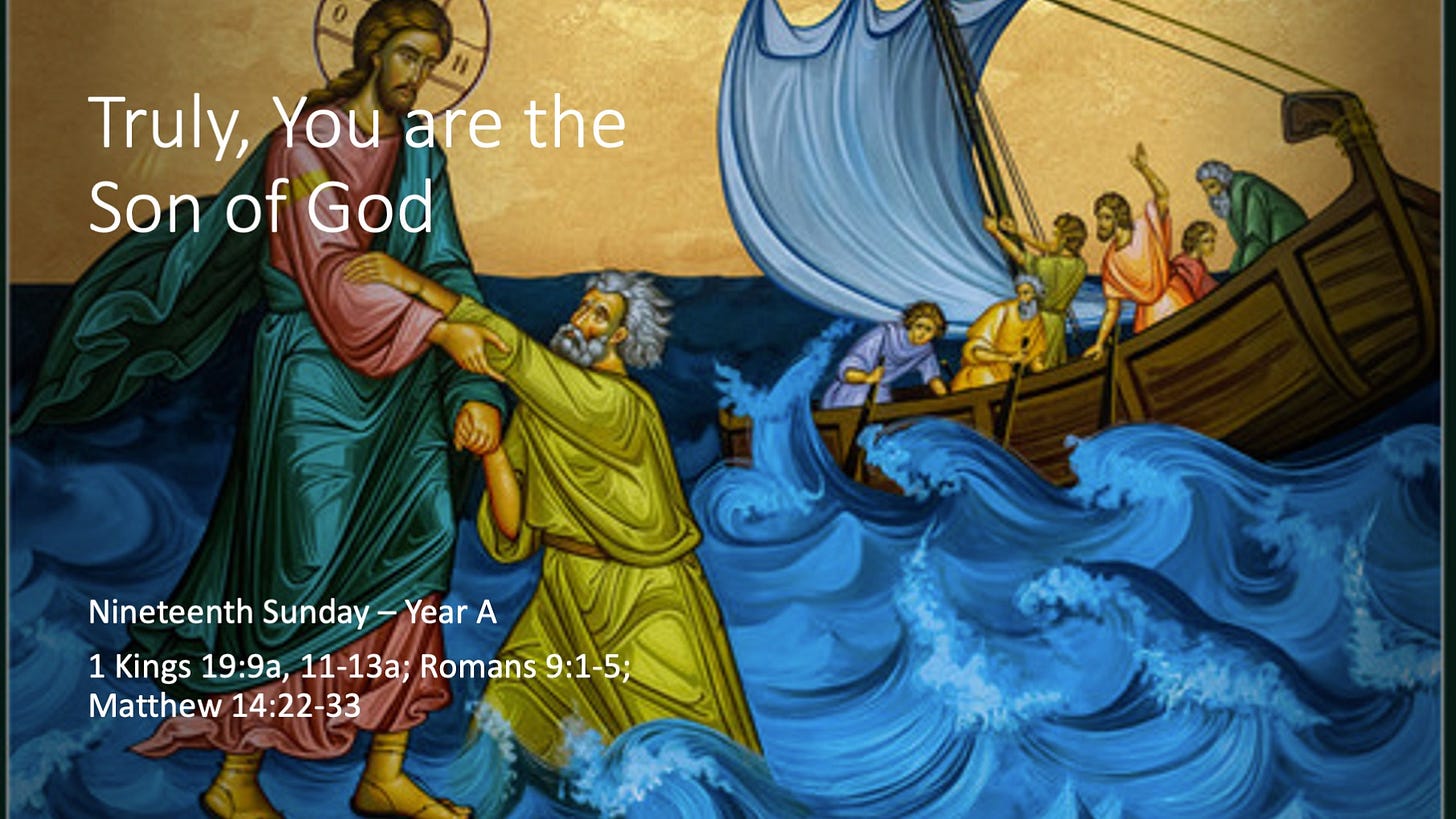1 Kings 19:9a, 11-13a; Romans 9:1-5; Matthew 14:22-33
"Your path led through the sea, your way through the mighty waters, though your footprints were not seen" (Ps. 77:19). The liturgy of the Word reveals to us the divinity of Christ. He who walks on the water is "above all, God blessed forever" (Rom. 9:5), and the Church worships him (Matt. 14:33; cf. Matt. 2:11).
In Jesus' time, the lake of Galilee was also called the Sea of Tiberias (John 21:1) in honor of the emperor Tiberius, during whose reign Jesus was crucified (14-37 AD). The boat symbolizing the Church was literally 'tormented' by the waves of that sea - a symbol of the Roman Empire persecuting Christians. Yet unable to 'sink' the Church (Matt. 16:18) and exhausting its strength (Matt. 14:32), the Roman Empire finally embraced Christianity as its religion. It is a message of hope for all Christians of all ages. The boat of the Church cannot be sunk, because the risen Christ is more powerful than any emperor and empire.
Seeing Jesus walking on the water the apostles said, "it is a phantom" (Matt. 14:26), and they were terrified. However, above their fear, there was a voice saying: "Courage. I am. Do not be afraid" (Matt. 14:27). The word "courage" can also be rendered as 'trust' and so we pray: Jesus, I trust in You. God's holy name is: "I AM Who Am" (Ex. 3:14). Jesus is the one "who is" (cf. Rom. 9:5) whose voice thunders above the raging waters (Ps. 29:3-4). Finally, "do not be afraid" is a command. We should drop once and for all the spirit of timidity and receive the spirit "of power and love and self-control" (2 Tim. 1:7).
"Lord, if it is you, command me to come to you on the water" (Matt. 14:28). Saint Peter was not interested in walking on the water, but in coming to the Lord. It was not a miracle that he was after, but to be with the Lord. The letter to the Hebrews tells us to fix "our eyes on Jesus, the pioneer and perfecter of faith" (Heb. 12:2). As long as we do that incredible things happen in our lives but the moment we allow ourselves to be distracted we get into trouble.
"Come" (Matt. 14:29). The Israelites entered into the midst of the sea and walked on the dry ground (Ex. 14:22; 15:19), but the Egyptians sank "into the depths like a stone" (Ex. 15:5). Peter was already within Jesus' reach when he began to sink also like a stone (Matt. 14:31). Why? To doubt (Matt. 14:31) is to be torn between two options and "a double-minded man" is "unstable in all his ways" (James 1:8). In each of us, there is that inner struggle between faith and doubt, courage and fear, that prevents us from walking confidently on the rough waves of life.
The waters came up to Peter's neck and he cried "Lord, save me" (Matt. 14:30; Ps. 69:2). And Jesus in his great mercy heard his cry. He did not let the floodwaters engulf him, the depths swallow him up, and the pit close its mouth over him (Ps. 69:16-17). Jesus reached out his mighty hand, took hold of him and drew him out of deep waters" (Ps. 18:17). Jesus and Peter both stand on the water, the wind is still blowing and Peter hears that he is a man of little faith (Matt. 14:31; cf. Matt. 8:26).
When everything became silent, Elijah covered his face and stood at the entrance of the cave before the Lord (1 Kings 19:13). When Jesus and Peter got into the boat the wind ceased and the boat became the Church, a place of worship and confession of faith in the divinity of Christ: "Truly, you are the Son of God" (Matt. 14:33). It is this faith that Saint Paul desires from the bottom of his broken heart for his kinsmen (Rom. 9:1-3). It is our mission to lead the whole world to the profession of this faith.




